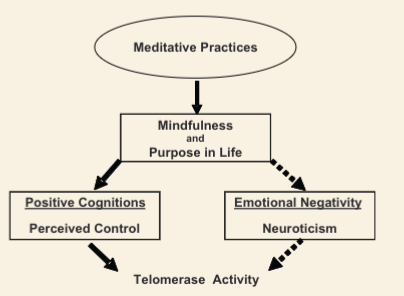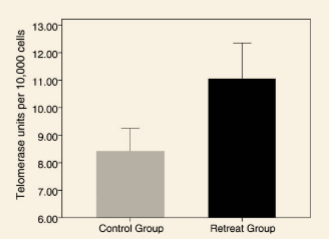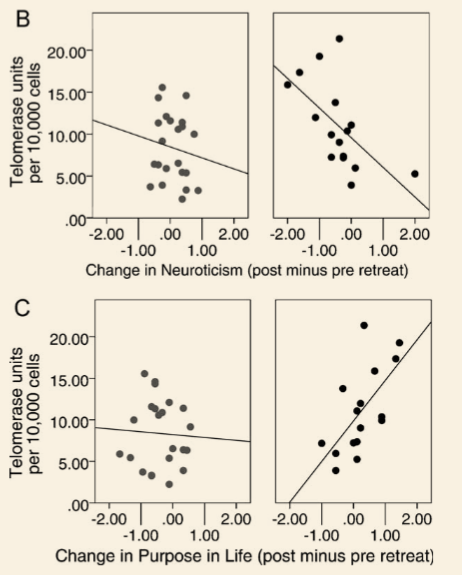Background Information
Telomerase
Telomerase is an enzyme that helps maintain telomere length by adding repetitive DNA sequences to the ends of chromosomes. It plays a crucial role in cellular aging and longevity, as it can counteract the natural shortening of telomeres that occurs with cell division. This enzyme is particularly active in stem cells, germline cells, and cancer cells, while its activity is typically low in most mature somatic cells, contributing to cellular senescence and aging.
More on Wikipedia
View in glossary
is the enzyme responsible for maintenance of the length of
Telomeres
Telomeres are protective caps at the end of chromosomes that shorten with each cell division. Telomere length is associated with aging and health, with longer telomeres linked to better health and longevity. Stress and lifestyle factors can affect telomere length, making them a potential marker of health and aging.
More on Wikipedia
View in glossary
. Telomeres are structures made from DNA sequences and proteins found at the ends of chromosomes. They cap and protect the end of a chromosome like the end of a shoelace. Recent findings have suggested that telomere length may be regulated by psychological factors, including stress, perception of stress, and well-being.
Telomere length has recently been proposed as a useful ‘psychobiomarker’ linking stress and disease. Shortened telomere length and reduced telomerase predict a host of health risks and diseases
Studies show that telomere length, on aveage, decreases with ago. However, other studies show that in a significant fraction of people, telomere length can increase over time. This suggests that there are potential malleable mechanisms that can influence telomere length.
The rate at which telomeres shorten or lengthen is dependent on many things, including the activity level of the enzyme
Telomerase
Telomerase is an enzyme that helps maintain telomere length by adding repetitive DNA sequences to the ends of chromosomes. It plays a crucial role in cellular aging and longevity, as it can counteract the natural shortening of telomeres that occurs with cell division. This enzyme is particularly active in stem cells, germline cells, and cancer cells, while its activity is typically low in most mature somatic cells, contributing to cellular senescence and aging.
More on Wikipedia
View in glossary
. It has been shown that there are relationships between the activity of telomerase and psychological factors, such as stress and well-being.
It is therefore possible that interventions that target psychological factors may also influence telomerase activity and telomere length. This includes meditation practice. As shown in this figure, there exists a plausible mechanism by which meditation practices inrease
mindfulness
Mindfulness is the psychological process of purposely bringing one’s attention to experiences occurring in the present moment without judgment. It involves maintaining awareness of thoughts, feelings, bodily sensations, and surrounding environment with an attitude of curiosity and acceptance. In meditation contexts, mindfulness practices typically involve focusing attention on the breath or body sensations as anchors to the present moment while acknowledging and releasing distracting thoughts.
More on Wikipedia
View in glossary
, which in turn can impact other psychological factors

Mindfulness Mindfulness is the psychological process of purposely bringing one’s attention to experiences occurring in the present moment without judgment. It involves maintaining awareness of thoughts, feelings, bodily sensations, and surrounding environment with an attitude of curiosity and acceptance. In meditation contexts, mindfulness practices typically involve focusing attention on the breath or body sensations as anchors to the present moment while acknowledging and releasing distracting thoughts.
More on Wikipedia
View in glossary is only one quality cultivated by meditative practice and other qualities have only recently begun to be explored. One understudied quality developed during meditative practice is a shift in intentions and priorities away from hedonic pleasure or superficial well-being, making one’s deeper “purpose in life” (a measurable psychological construct; Ryff, 1989) clearer.
This study focuses on the relationship between meditation and telomerase activity, and the psychological factors that mediate this relationship. More recent research by Dasanayaka, Sirisena, & Samaranayake (2023) extends these findings, showing that long-term meditators have significantly longer telomeres and altered methylation patterns of the hTERT promoter, further supporting the connection between meditation practice and cellular aging.
What They Did
The authors performed a comparison between individuals participating in a three-month intensive meditation retreat and a matched wait-list control group. Thirty individuals were in each of the meditation and waiting-list groups. The meditation retreat involved daily practices aimed at enhancing mindfulness, perceived control, purpose in life, and reducing neuroticism, with participants engaging in approximately six hours of meditation each day. Psychological assessments were conducted before and after the retreat to evaluate changes in the aforementioned psychological states, and blood samples were collected post-retreat from both groups to measure telomerase activity. The relevant psychological measures were:
- Mindfulness: Assessed with the Five Facet Mindfulness Questionnaire, evaluating the ability to maintain attention on present experiences and practice non-judgmental awareness.
- Purpose in Life: Measured using the Purpose in Life subscale of Ryff’s Psychological Well-Being Scales, indicating the extent to which individuals feel their lives have meaning and direction.
- Perceived Control: Evaluated through the Environmental Mastery subscale of Ryff’s scales, reflecting individuals’ beliefs in their capacity to manage and control their life circumstances.
- Neuroticism: Assessed with the Big Five Inventory’s Neuroticism scale, measuring the tendency towards experiencing negative emotions like anxiety, depression, and vulnerability.
One Big Result
Psychologically, the retreat participants
showed increases in Mindfulness and Purpose in Life, along with increased Perceived Control and decreased Neuroticism.
The differences between the meditation group and control group were significant in all cases. Furthermore, in follow-up blood work, the meditators had significantly increased levels of telomerase activity

Furthermore, the amount of change in telomerase activity was correlated with the amount of change in the psychological measures. A meditator who experienced a stronger drop in neuroticism, for example, also experienced a stronger increase in telomerase activity.

This result is striking and has interesting connotations. Telomerase activity prevents telomere shortening, and shortened telomeres foreshadow early death. This is suggestive that contemplative practices can have a direct impact on the aging process, as the authors note:
with only two exceptions […], there are no known pharmacological or behavioral interventions that have this beneficial effect
Miscellaneous Interesting Takeaways
How Does Meditation Increase Life Purpose
This study included an observed correlation between meditation and purpose in life:
Meditation and other contemplative practices promote a sense of purpose and direction in life, as demonstrated here. This may occur as intentions and priorities shift away from hedonic pleasure to more genuine contentment and a greater sense of contributing to human welfare
And noted that purpose in life mediated changes in both perceived control and neuroticism. This is suggestive that the increase in purpose in life is a key factor in the other psychological changes that meditation can bring about.
longitudinal studies suggest that the ability to find meaning in a stressful life event precedes changes in affect
Although the study here does not conclusively demonstrate causality here, other studies also suggest that meditive practice causes a
gradual, daily accumulation of positive emotions that broaden the meditator’s viewpoint, setting up a trajectory of growth in which the specific psychological resources of “purpose in life” and “mindfulness” expand, which in turn increases life satisfaction and reduces depressive symptoms
The authors conclude by noting that
it is provocative that purpose in life may reflect a cognitive shift that both reshapes two contributors to stress, neuroticism and low perceived control, and also promotes increased telomerase activity.
This study builds upon earlier work by Davidson, Kabat-Zinn et al. (2003), which demonstrated that even a shorter 8-week mindfulness intervention could produce measurable changes in immune function and brain activity patterns. Interestingly, Shields et al. (2020) identified inflammation as a factor that can independently impair cognitive control, suggesting potential bidirectional relationships between psychological states, inflammatory processes, and cellular aging mechanisms.
Citation
Jacobs, T. L., Epel, E. S., Lin, J., Blackburn, E. H., Wolkowitz, O. M., Bridwell, D. A., Zanesco, A. P., Aichele, S. R., Sahdra, B. K., MacLean, K. A., King, B. G., Shaver, P. R., Rosenberg, E. L., Ferrer, E., Wallace, B. A., & Saron, C. D. (2011). Intensive meditation training, immune cell telomerase activity, and psychological mediators. In Psychoneuroendocrinology (Vol. 36, Issue 5, pp. 664–681). Elsevier BV. 10.1016/j.psyneuen.2010.09.010